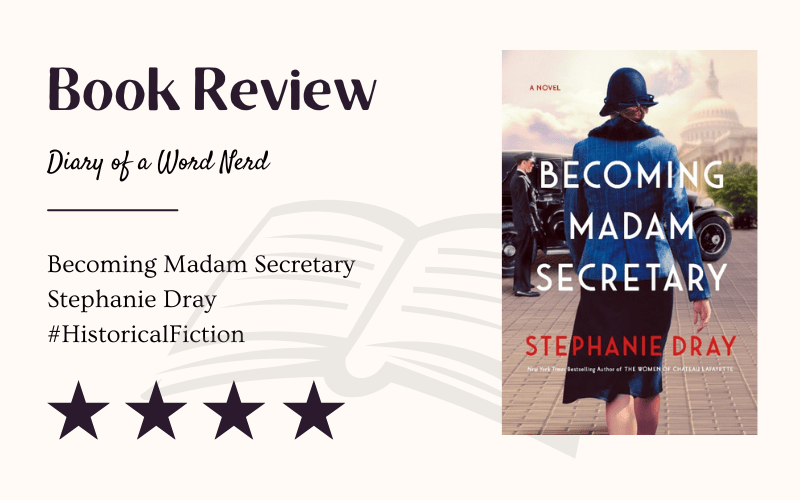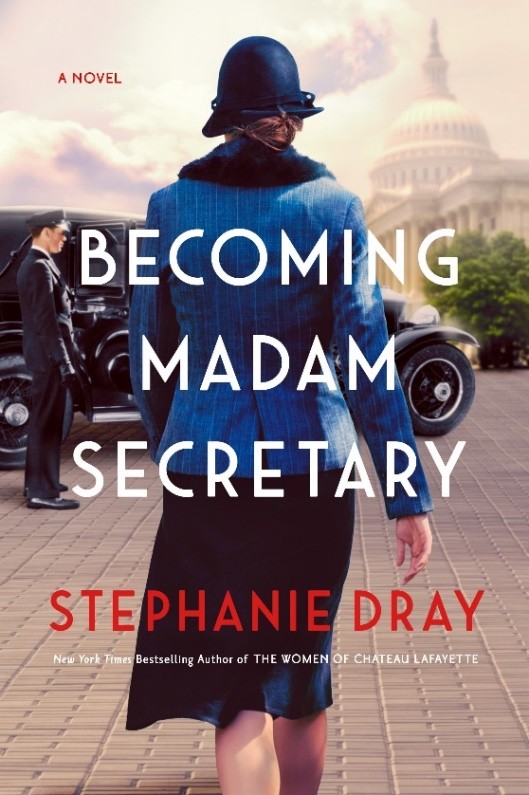Many today consider Social Security benefits a non-negotiable part of American life, something we’ve always had and will have. But Social Security wouldn’t exist without the hard work of Ms. Frances Perkins, the first woman who served on a presidential cabinet as FDR’s Secretary of Labor. During the throes of The Great Depression, Ms. Perkins’ persistence in the face of personal tragedy, political criticism, and blatant misogyny not only gave Americans the New Deal, but also paved the way for women who wished to serve in public office.
And yet, until I read Stephanie Dray’s Becoming Madam Secretary, I had never heard of Frances Perkins.
Anyone interested in history, public service, and the evolving role of women in America during the 20th century should read Dray’s new release.
Premise
With poverty devastating the US and war brewing in Europe, FDR won the American presidency and immediately asked Frances Perkins to serve on his cabinet as Secretary of Labor. The two had become acquainted in New York political circles, and Perkins was not always a fan of the crafty, arrogant Franklin Roosevelt. But after illness tainted both of their lives, they developed a friendship and political partnership that would change the trajectory of modern America.
What I liked
Frances intrigued me from the start. She grew up in a comfortable middle class family in Massachusetts, attended college, and taught physics and biology. But by 1910, she felt compelled to help the poor, and her interests turned to social reform.
Early in the novel, when contending with another female social reformer who questions Frances’ motivations, Frances replies,
“… many people in America believe poverty is a moral problem having to do with spirits, sloth, or some other sin we can blame on individuals. But I believe that poverty in America is an economic problem that can be solved, and I intend to solve it.”
Go Frances! Early in her social reform days, when she was accosted by a pimp, Frances literally beat him off with her parasol. This woman had pluck! (Which sometimes worked against her with the press and political adversaries.)
After earning a masters degree in economics and sociology from Columbia, Frances became the secretary of the New York Consumers League. In that role, she investigated working conditions and fought for laws to limit working hours. In 1918, she was the first woman appointed to the New York State Industrial Commission, which put her in contact with several influential politicians, including FDR.
I also enjoyed learning about FDR and his determination in the face of polio, world war, and a failing economy. Even though he and Frances didn’t always see eye to eye, he recognized her talent and bolstered her career. Without Frances, The New Deal might never have happened. FDR and Frances cared deeply not only for the rights of the poor, but for the survival of the country. Their passion is as relevant today as it was while they fought for American democracy.
If we don’t lend a hand to millions of folks out there who’ve lost everything, they’ll be sitting ducks for nationalist demagogues. Just look at what happened in Italy and Germany. It’s going to come to blows one day. We’ve got to give our people a reason to believe in our democratic system so they’ll stand up of it. If we want to keep our American way of life alive and well, we need to give our folks some security and a democracy worth fighting for.”
FDR speaking in Becoming Madam Secretary.
In Becoming Madam Secretary, Dray highlights the sacrifice and struggle of working in public office, especially for a woman in the early 20th Century. Frances’ husband struggled with bipolar disorder, and eventually moved to an institution. She kept his condition quiet to avoid public scandal. Her often petulant daughter resented having a such a busy mother, adding more stress to Frances’ life. Dray deftly examines the precarious balance between motherhood and career, still so relevant today. She also highlights the burden Perkins carried as she broke barriers for other women.
I was coming to the uncomfortable realization that other women felt a strong personal investment in my career. Even those who weren’t my friends. Beyond any policy I might advance, they wanted to see me succeed. As if my rise validated their won ambitions and self-worth as women. It was both an honor and a terribly humbling to hold such a mantle.
While the events of Becoming Madam Secretary happened almost 100 years ago, they ring familiar in today’s political climate. For example, as Hitler made concerning changes in Germany, Frances fought to bring Jewish refugees to the United States. “Nativists” at the time accused her of being a communist and worse. The rhetoric echoes some of the language we hear today regarding immigrants.
What I didn’t like
Becoming Madame Secretary started slowly for me. There were also lots of characters introduced in the early chapters, and the name dropping made me feel like a newbie politician in the New York legislature. At times, the dialogue, especially between Frances and her friend and admirer Sinclair Lewis, felt awkward and stilted. However, as the book progressed, it sucked me in and I looked forward to reading about Frances and finding out how she managed to get her policy passed.
Recommendation
I have read several of Dray’s other historical fiction novels, including My Dear Hamilton and The Women of Chateau Lafayette. Becoming Madam Secretary is one of my favorites. If you love historical fiction or inspiring stories about strong women, you should read Becoming Madam Secretary. Dray’s novel is the perfect way to celebrate Women’s History Month.
If you want to learn more about Frances Perkins, the most recent episode of the What’s Her Name Podcast features a discussion with Stephanie Dray about the amazing Frances Perkins.
Have you read or learned about an amazing woman recently? Please share in the comments!
Thanks for getting nerdy with me!




I’m so psyched that you plugged What’s Her Name! It is still astonishing that so many influential and hard-working women are left out of the historical narrative — I’m sure some of it is due to less records documenting their work. It reminds me of the Guggenheim’s Going Dark exhibit — what perspectives are we omitting from the central narrative?
I also loved the snippet you included about FDR and Frances working together despite not seeing eye to eye. In our divided political climate, overcoming differences is especially important — great to see an example 🙂
I am immediately adding this to my reading list!